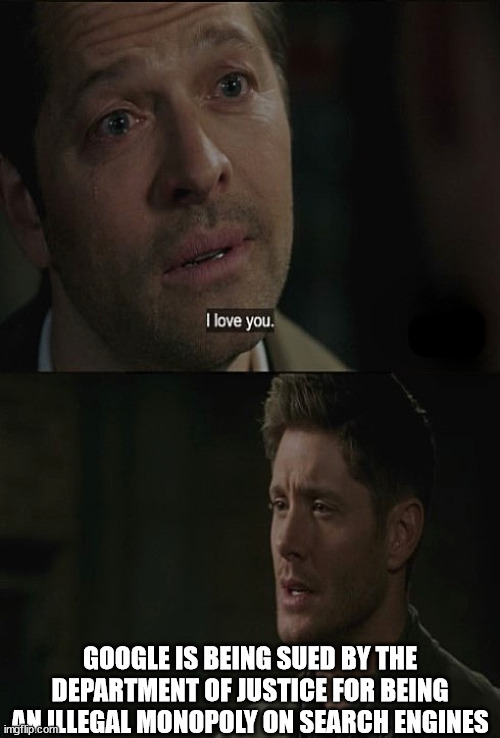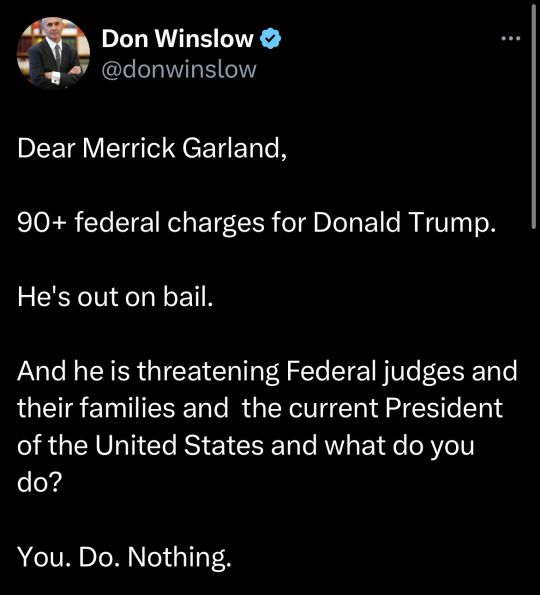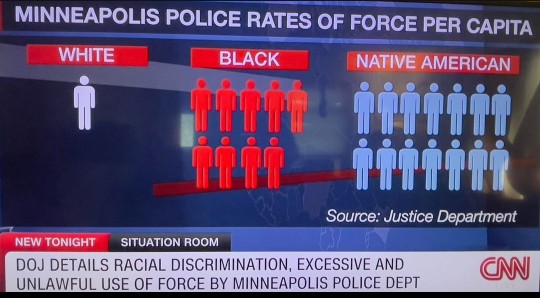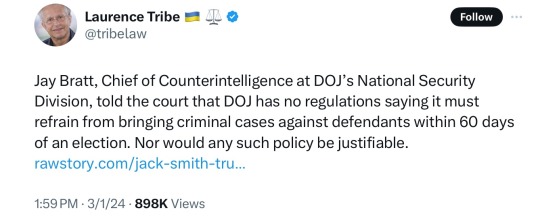#department of justice
Text
gaslighting #DelayDon doesn’t want you to remember his failures

#democrats#republicans#donald trump#trumpchumps#doj#scotus#department of justice#president joe biden#vp kamala harris#ali velshi
15 notes
·
View notes
Text
DON'T LET THIS GO OUT OF CIRCULATION. ADD MORE ONTO IT. QUEUE IT. DON'T LET THIS SITE FUCKING FORGET. THIS TRIAL COULD HAVE MASSIVE CONSEQUENCES FOR THE WHOLE INTERNET.
EDIT:
Originally I linked an MSN article. I was unaware they're not a trustworthy source, but many lovely people in the notes pointed it out and pointed out that the article I linked had issues, linking much better sources.
Here's an excellent addition to the post by @/thesoulofthebeautiful:
Also, I saw a lot of people freaking out in the notes like "Oh shit, is Google gonna get completely taken down????" No. It won't. Google's a trillion dollar company, this won't completely destroy it. What it'll hopefully do is keep them from having Google be the default engine EVERYWHERE. If Google loses, that is a good thing. This WILL shake up the internet, but it won't be the end.
Cool? Cool. Here's a Destiel meme:

IF YOU REPOST THIS MEME, LINK THE SOURCES
40K notes
·
View notes
Text
Note: They're saying "alleged" because that's what journalists are supposed to do until there's a conviction. ABC isn't trying to cast doubt, they're trying to follow professional standards and also not get sued for libel.
"Former President Donald Trump, bent on staying in power, undertook a sweeping "criminal scheme" to overturn the results of the 2020 election, including repeatedly pushing lies about the results despite knowing that they were correct, and doubling down on those falsehoods as the Jan. 6 riot raged, a sweeping federal indictment alleges.
This is the third indictment faced by the former president, who -- as the Republican frontrunner in the 2024 presidential race -- continues to insist that the vote was rigged.
Prosecutors say the alleged scheme, which they say involved six unnamed co-conspirators, included enlisting a slate of so-called "fake electors" targeting several states; using the Justice Department to conduct "sham election crime investigations"; enlisting the vice president to "alter the election results"; and doubling down on false claims as the Jan. 6 riot ensued -- all in an effort to subvert democracy and stay in power.
The six alleged co-conspirators include several attorneys and a Justice Department official.
The sweeping indictment, based on the investigation by special counsel Jack Smith, charges Trump with four felony counts: conspiracy to defraud the United States, conspiracy to obstruct an official proceeding, obstruction of and attempt to obstruct an official proceeding, and conspiracy against rights...
In the history of the country, no president or former president had ever been indicted prior to Trump's first indictment in April."
-via ABC News, August 1, 2023
WE FUCKING DID IT
#trump#jack smith#donald trump#trump indictment#united states#us politics#gop#election 2024#mike pence#department of justice#justice system#good news#hope#jan 6#jan 6 insurrection#insurrection
2K notes
·
View notes
Text


A miscarriage of justice at the hands of Merrick Garland.
#department of justice#merrick garland#america#failure#democrats#republicans#jan 6th#insurrection#donald trump#justice#vote blue
89 notes
·
View notes
Text
UVALDE, Texas (AP) — Police officials who responded to the deadly Uvalde, Texas, elementary school shooting waited far too long to confront the gunman, acted with “no urgency” in establishing a command post and communicated inaccurate information to grieving families, according to a Justice Department report released Thursday that identifies “cascading failures” in law enforcement's handling of the massacre.
The report, the most comprehensive federal accounting of the maligned police response to the May 24, 2022, shooting at Robb Elementary School, catalogs a sweeping array of training, communication, leadership and technology problems that federal officials say contributed to the crisis lasting far longer than necessary. All the while, the report says, terrified students inside the classrooms called 911 and agonized parents begged officers to go in.
108 notes
·
View notes
Text
Forget hush money payments to porn stars hidden as business expenses. Forget showing off classified documents about Iran attack plans to visitors, and then ordering the pool guy to erase the security tapes revealing that he was still holding on to documents that he had promised to return. Forget even corrupt attempts to interfere with election results in Georgia in 2020.
The federal indictment just handed down by special counsel Jack Smith is not only the most important indictment by far of former President Donald Trump. It is perhaps the most important indictment ever handed down to safeguard American democracy and the rule of law in any U.S. court against anyone.
For those who have been closely following Trump’s attempt to subvert the results of the 2020 election, there was little new information contained in the indictment. In straightforward language with mountains of evidence, the 45-page document explains how Trump, acting with six (so far unnamed, but easily recognizable) co-conspirators, engaged in a scheme to repeatedly make false claims that the 2020 election was stolen or rigged, and to use those false claims as a predicate to try to steal the election. The means of election theft were national, not just confined to one state, as in the expected Georgia prosecution. And they were technical—submitting alternative slates of presidential electors to Congress, and arguing that state legislatures had powers under the Constitution and an old federal law, the Electoral Count Act, to ignore the will of the state’s voters.
But Trump’s corrupt intent was clear: He was repeatedly told that the election was not stolen, and he knew that no evidence supported his outrageous claims of ballot tampering. He nonetheless allegedly tried to pressure state legislators, state election officials, Department of Justice officials, and his own vice president to manipulate these arcane, complex election rules to turn himself from an election loser into an election winner. That’s the definition of election subversion.
He’s now charged with a conspiracy to defraud the United States, a conspiracy to willfully deprive citizens the right to vote, a conspiracy to obstruct an official proceeding, and obstructing that official proceeding. If you’re doing the math, that is four new counts on top of the dozens he faces in the classified documents case in Florida and the hush money case in New York.
So far Trump has not been accountable for these actions to try to steal an American election. Although the House impeached Trump for his efforts soon after they occurred, the Senate did not convict. Senate Minority Leader Mitch McConnell, in voting against conviction in the Senate despite undeniable evidence of attempted election subversion by his fellow Republican, pointed to the criminal justice system as the appropriate place to serve up justice. But the wheels of justice have turned very slowly. Reports say that Attorney General Merrick Garland was at first too cautious about pursuing charges against Trump despite Trump’s unprecedented attack on our democracy. Once Garland appointed Jack Smith as a special counsel to handle Trump claims following the release of seemingly irrefutable evidence that Trump broke laws related to the handling of classified documents, the die was cast.
It is hard to overstate the stakes riding on this indictment and prosecution. New polling from the New York Times shows that Trump not only has a commanding lead among those Republicans seeking the party’s presidential nomination in 2024; he remains very competitive in a race against Joe Biden. After nearly a decade of Trump convincing many in the public that all charges against him are politically motivated, he’s virtually inoculated himself against political repercussions for deadly serious criminal counts. He’s miraculously seen a boost in support and fundraising after each indictment (though recent signs are that the indictments are beginning to take a small toll). One should not underestimate the chances that Donald Trump could be elected president in 2024 against Joe Biden—especially if Biden suffers any kind of health setback in the period up to the election—even if Trump is put on trial and convicted of crimes.
A trial is the best chance to educate the American public, as the Jan. 6 House committee hearings did to some extent, about the actions Trump allegedly took to undermine American democracy and the rule of law. Constant publicity from the trial would give the American people in the middle of the election season a close look at the actions Trump took for his own personal benefit while putting lives and the country at risk. It, of course, also serves the goals of justice and of deterring Trump, or any future like-minded would-be authoritarian, from attempting any similar attack on American democracy ever again.
Trump now has two legal strategies he can pursue in fighting these charges, aside from continuing to attack the prosecutions as politically motivated. The first strategy, which he will no doubt pursue, is to run out the clock. It’s going to be tough for this case to go to trial before the next election given that it is much more factually complex than the classified documents or hush money cases. There are potentially hundreds of witnesses and theories of conspiracies that will take much to untangle. Had the indictment come any later, I believe a trial before November 2024 would have been impossible. With D.C. District Judge Tanya Chutkan—a President Barack Obama appointee who has treated previous Jan. 6 cases before her court with expedition and seriousness—apparently in charge of this case, there is still a chance to avoid a case of justice delayed being justice denied.
If Trump can run out the clock before conviction and be reelected, though, he can get rid of Jack Smith and appoint an attorney general who will do his bidding. He could even try to pardon himself from charges if elected in 2024 (a gambit that may or may not be legal). He could then sic his attorney general on political adversaries with prosecutions not grounded in any evidence, something he has repeatedly promised on the campaign trail.
Trump’s other legal strategy is to argue that prosecutors cannot prove the charges. For example, the government will have to prove that Trump not only intended to interfere with Congress’ fair counting of the electoral college votes in 2020 but also that Trump did so “corruptly.” Trump will put his state of mind at issue, arguing that despite all the evidence, he had an honest belief the election was being stolen from him.
He also will likely assert First Amendment defenses. As the indictment itself notes near the beginning, “the Defendant has a right, like every American, to speak publicly about the election and even to claim, falsely, that there had been outcome-determinative fraud during the election and that he had won.” But Trump did not just state the false claims; he allegedly used the false claims to engage in a conspiracy to steal the election. There is no First Amendment right to use speech to subvert an election, any more than there is a First Amendment right to use speech to bribe, threaten, or intimidate.
Putting Trump before a jury, if the case can get that far before the 2024 elections, is not certain to yield a conviction. It carries risks. But as I wrote last year in the New York Times, the risks to our system of government of not prosecuting Donald Trump are greater than the risks of prosecuting him.
It’s not hyperbole to say that the conduct of this prosecution will greatly influence whether the U.S. remains a thriving democracy after 2024.
#us politics#news#slate#false slate of electors#republicans#donald trump#conservatives#2023#United States v. Donald Trump#trump administration#2020 election#Electoral Count Act#us constitution#14th amendment#ballot tampering#election subversion#Department of Justice#jack smith#ag merrick garland#biden administration#conspiracy to defraud the United States#conspiracy to willfully deprive citizens the right to vote#conspiracy to obstruct an official proceeding#obstruction of congress#2024 presidential race#2024 elections#Judge Tanya Chutkan
174 notes
·
View notes
Text
A two year review finished by the DOJ shows Minneapolis Police's widespread discrimination against it's Native & Black residents. The review also shows excessive/deadly force, the use of force following stops, and discrimination against those with behavioral health disabilities. The CDC & 2019 Census data released show that Native people suffer from police deaths 2.2 % higher than white people and 1.2 % higher than black people. Here is the report
This is really scary

#native tumblr#native issues#native rights#native lives matter#minneapolis#department of justice#police brutality#killer cops#blacklivesmatter
134 notes
·
View notes
Text

#republican assholes#traitor trump#crooked donald#traitor#resist#maga morons#Trump prosecution#department of justice
49 notes
·
View notes
Text
Jim Jordan slaps AG Merrick Garland with subpoena over alleged DOJ surveillance of Congress https://nypost.com/2023/12/19/news/jordan-slaps-ag-garland-with-subpoena-over-alleged-doj-surveillance-of-congress/
#corruption#department of justice#trump#ivanka#trump 2024#president trump#americans first#repost#america first#donald trump#america#democrats
37 notes
·
View notes
Text



#us politics#2022#memes#shitpost#republicans#conservatives#donald trump#mar a lago#sedition#treason#classified documents#top secret documents#fbi#fbi raid#department of justice
475 notes
·
View notes
Text
#tiktok#apple#anti trust#anti trust lawsuit#antitrust law#lawsuit#monopoly#capitalism is the worst#capitalism is evil#capitalism kills#capitalism#anti capitalist#capitalist hell#capitalist dystopia#capitalist bullshit#capitalism is hell#capitalism is a scam#capitalism is a disease#us govt#us government#federal government#department of justice
29 notes
·
View notes
Text

If you believe the gQp repigliKlan cult attack on women just began - then YOU have NOT been paying attention
#democrats#republicans#donald trump#democracy#doj#government#trumpchumps#scotus#ivanka trump#department of justice#women’s rights#women#melaniatrump#erictrump#donjrtrump#tiffanytrump#laratrump#nicole wallace#rachel maddow#jen psaki
3K notes
·
View notes
Text
Read This. Sign This. Share This.
#Nex Benedict#Oklahoma#Trans Rights#Hate Crime#Republican Fascists#Department of Justice#Justice For Nex
20 notes
·
View notes
Text
Have some more good news!
We have lots of good news to start the week! Learn more below.





#good news#good trans news#kansas#missouri#department of justice#trans#transgender#trans rights#transgender rights#lgbtq#lgbt#lgbtq+#activism#politics#political#nonprofit community justice#US news#news#protect trans kids#protect trans lives#trans formations project#queer activism#trans is not a crime#nonprofit#us politics
115 notes
·
View notes
Text
FBI resisted opening probe into Trump’s role in Jan. 6 for more than a year
In the DOJ’s investigation of Jan. 6, key Justice officials also quashed an early plan for a task force focused on people in Trump’s orbit

We KNEW the DOJ was avoiding investigating Trump for January 6th. According to this report by Carol D. Leonnig and Aaron C. Davis for The Washington Post, the DOJ dragged its collective feet in starting the Trump investigation--for over a year. It was not until the House Jan. 6th committee and others started to investigate Trump's involvement in the attempted coup, did the DOJ become embarrassed enough to start their own investigation.
In this regard, contrary to what certain Republicans claim, the DOJ was NOT AT ALL "weaponized" against Trump. Rather, they were trying to avoid investigating him.
Below are some excerpts from this report:
A Washington Post investigation found that more than a year would pass before prosecutors and FBI agents jointly embarked on a formal probe of actions directed from the White House to try to steal the election. Even then, the FBI stopped short of identifying the former president as a focus of that investigation.
A wariness about appearing partisan, institutional caution, and clashes over how much evidence was sufficient to investigate the actions of Trump and those around him all contributed to the slow pace. Garland and the deputy attorney general, Lisa Monaco, charted a cautious course aimed at restoring public trust in the department while some prosecutors below them chafed, feeling top officials were shying away from looking at evidence of potential crimes by Trump and those close to him, The Post found.
[See more under the cut.]
[...]
Whether a decision about Trump’s culpability for Jan. 6 could have come any earlier is unclear. The delays in examining that question began before Garland was even confirmed. Sherwin, senior Justice Department officials and Paul Abbate, the top deputy to FBI Director Christopher A. Wray, quashed a plan by prosecutors in the U.S. attorney’s office to directly investigate Trump associates for any links to the riot, deeming it premature, according to five individuals familiar with the decision. Instead, they insisted on a methodical approach — focusing first on rioters and going up the ladder.
The strategy was embraced by Garland, Monaco and Wray. They remained committed to it even as evidence emerged of an organized, weeks-long effort by Trump and his advisers before Jan. 6 to pressure state leaders, Justice officials and Vice President Mike Pence to block the certification of Biden’s victory.
In the weeks before Jan. 6, Trump supporters boasted publicly that they had submitted fake electors on his behalf, but the Justice Department declined to investigate the matter in February 2021, The Post found. The department did not actively probe the effort for nearly a year, and the FBI did not open an investigation of the electors scheme until April 2022, about 15 months after the attack.
The Justice Department’s painstaking approach to investigating Trump can be traced to Garland’s desire to turn the page from missteps, bruising attacks and allegations of partisanship in the department’s recent investigations of both Russia’s interference in the 2016 presidential election and Hillary Clinton’s use of a private email server.
Inside Justice, however, some have complained that the attorney general’s determination to steer clear of any claims of political motive has chilled efforts to investigate the former president. “You couldn’t use the T word,” said one former Justice official briefed on prosecutors’ discussions.
[...]
“A decision was made early on to focus DOJ resources on the riot,” said one former Justice Department official familiar with the debates. “The notion of opening up on Trump and high-level political operatives was seen as fraught with peril. When Lisa and Garland came on board, they were fully onboard with that approach.”
Some prosecutors even had the impression that Trump had become a taboo topic at Main Justice. Colleagues responsible for preparing briefing materials and updates for Garland and Monaco were warned to focus on foot soldiers and to avoid mentioning Trump or his close allies.
[...]
That fall and winter, a House committee pursuing its own investigation into Jan. 6 conducted interviews with top Trump administration officials. Privately, its chief investigator, Timothy Heaphy, a former U.S. attorney, had alerted prosecutors in the D.C. U.S. attorney’s office to a few details his team had uncovered about Trump’s pressure on Justice Department officials and Pence to block the election results, according to a person familiar with the exchanges. But eye-grabbing news accounts about the committee’s discoveries fueled public criticism that the Justice Department appeared to be lagging.
[...]
[Between January and February 2022 there was renewed interest in looking at the role of Trump and those close to him in the "fake elector" scheme.] One person directly familiar with the department’s new interest in the case said it felt as though the department was reacting to the House committee’s work as well as heightened media coverage and commentary. “Only after they were embarrassed did they start looking,” the person said.
This is a very long article and you will have to read the rest for yourself. But after reading this article, it now seems clear that if the Jan. 6th Committee and others had not begun to investigate Trump's involvement in the attempted coup, the DOJ would have never gotten involved.
#trump#merrick garland#department of justice#january 6th#delay in investigating trump#the washington post
92 notes
·
View notes
Text
Surveying the reactions of top Republicans after Donald Trump’s indictment on charges of mishandling classified information, you’d think the country was in the midst of a coup.
“It is unconscionable for a President to indict the leading candidate opposing him,” House Majority Leader Kevin McCarthy tweeted. “The weaponization of federal law enforcement represents a mortal threat to a free society,” Florida Gov. Ron DeSantis claimed. “There is no limit to what these people will do to protect their power & destroy those who threaten it, even if it means ripping our country apart,” Sen. Marco Rubio declared.
These are extraordinary claims — and all made on Thursday night before the indictment or the evidence behind it was made public. On Friday morning, we learned thanks to CNN that Trump is literally on tape in 2021 discussing having documents in his possession that he knew were still classified. “As president, I could have declassified, but now I can’t,” he reportedly said.
The tape may or may not prove dispositive in a court of law; there’s certainly room for good-faith disagreement on the strength of the case against Trump. But the tape is at least very strong evidence that these charges are not some kind of Biden-mandated witch hunt but instead based on very serious allegations of wrongdoing.
Yet top Republicans — including Trump’s leading rival for the 2024 election — have shown no signs of changing their tune, and instead are lining up behind Trump’s conspiracy theory that special counsel Jack Smith is leading Joe Biden’s personal Stasi.
This paranoid reaction to Trump’s indictment is not a surprise. Over the past several years, the political right has been captured by a worldview that sees the entirety of mainstream society arranged against it. According to this thinking, America’s “woke” power elite, including ostensibly neutral institutions of governance like the Justice Department, is determined to stamp out the conservative way of life. You are either with us or against us — and attempting to send Trump to jail, whatever the reason, puts you on the wrong side.
Such once-fringe thinking now dominates the Republican Party at the very highest levels. Whether people like McCarthy and DeSantis actually believe it is immaterial: The fact that they feel the need to say such wild things indicates just how central anti-institutional paranoia has become in Republican politics.
The dangers of this going forward, as Trump faces trial and America faces an election where he is the GOP’s most likely presidential candidate, should not be underestimated. A democracy whose basic institutional functions come under attack is a democracy in mortal peril.
THE PARANOID STYLE IN REPUBLICAN POLITICS
The entire Trump phenomenon was, from the very beginning, about conservative fear of losing America. Study after study after study has found that Trump voters in the GOP primary and electorate are motivated by a concern that the United States is becoming literally unrecognizable: populated by people who look different and think differently than they do.
The fears of the base were reflected in the language of the elite. In 2016, the most famous intellectual case for Trump in 2016 was Michael Anton’s “Flight 93” essay — which argued that these changes were transforming the government in ways that handed more and more control over American government to the left. Anton spoke of a “bipartisan junta” that controlled the centers of power and wielded it against conservative institutions, a kind of soft coup against ordinary Americans backstopped by demographic change.
“Our side has been losing consistently since 1988,” Anton wrote. “The ceaseless importation of Third World foreigners with no tradition of, taste for, or experience in liberty means that the electorate grows more left, more Democratic, less Republican, less republican, and less traditionally American with every cycle.”
Anton’s essay, seen as fringe at the time, captured an essential linkage of the Trump era: between the traditional conservative sense of alienation from mainstream American culture and growing hostility to its governing institutions. The general conservative sense that they were losing America demographically and spiritually could easily be translated into a case that the government itself was hostile to their interests.
So when Trump began facing legal trouble during his presidency, at first over his campaign’s ties to Russia, he ran a version of the Anton playbook (Anton was, at the time, serving in Trump’s White House). He argued, in now-familiar but then-novel terms, that the investigation was a “deep state” plot against Trump — that special counsel Robert Mueller and his investigators were Democrats who sought only to destroy his presidency.
Faced with this challenge, the rest of the Republican Party had a choice: They could defend the underlying integrity of the Justice Department, even while remaining skeptical of the merits of this specific investigation, or fully accede to the Trumpist “witch hunt” narrative. We know which one they chose, and we know why they chose it: Trump had built such a powerful following on the basis of his paranoid critique of America that any Republican who challenged it risked career suicide.
The Russia investigation set a pattern that would endure for the entire Trump presidency. Again and again, when faced with credible allegations of wrongdoing, Republicans indulged Trump’s wildest fantasies out of either fear or genuine belief. The Anton worldview, once the province of cranks, evolved into the official narrative of the Republican Party — an evolution cemented when Trump attempted to overthrow the 2020 election and the party elite permitted him to do so.
In the Biden years, with Republicans out of power, the narrative of an entire government arranged against them only became more credible in the eyes of the base. Surveys consistently showed that a large majority of Republicans believed his claims of voter fraud; political scientists have shown that this belief is likely genuine and that Republican politicians who parrot Trump’s lies improve their standings in the eyes of the base.
The result is a party that has, in the past several years, grown increasingly radicalized against the core institutions of America. They believe that everything in America is turning against them: not just the traditional enemies like the media and Hollywood, but also the military, big business, and even the US Olympic team. If you express agreement with the left on anything from LGBTQ issues to Trump’s fitness for office, you are an enemy of the right.
The dangers of this shift cannot be overestimated. Republicans are already vowing to “bring accountability to the DOJ” (DeSantis) and “hold this brazen weaponization of power accountable” (McCarthy). If Republicans do win the White House in 2024, the chances of an attempt to turn the Justice Department into an actually political institution are very high. If Trump is their candidate, it’s basically a certainty.
And if they lose — well, January 6 showed us what could happen when Republicans believe they’ve lost illegitimately. And we’re already seeing paranoia about this indictment bleed over into paranoia about the upcoming election.
“Biden is attacking his most likely 2024 opponent. He’s using the justice system to preemptively steal the 2024 election. This is what’s happening, plain and simple,” writes Sen. J.D. Vance (R-OH).
Democracy depends on both sides respecting the rules of the game. But one side has decided, without any real evidence, that the rules are rigged against them — and have demonstrated a willingness to disregard them as a result.
#us politics#news#vox#classified documents#classified documents probe#donald trump#republicans#conservatives#2023#department of justice#jack smith#ag merrick garland#rep. kevin mccarthy#gov. ron desantis#Sen. Marco Rubio#sen. j.d. vance#Michael Anton#conspiracy theorists
100 notes
·
View notes